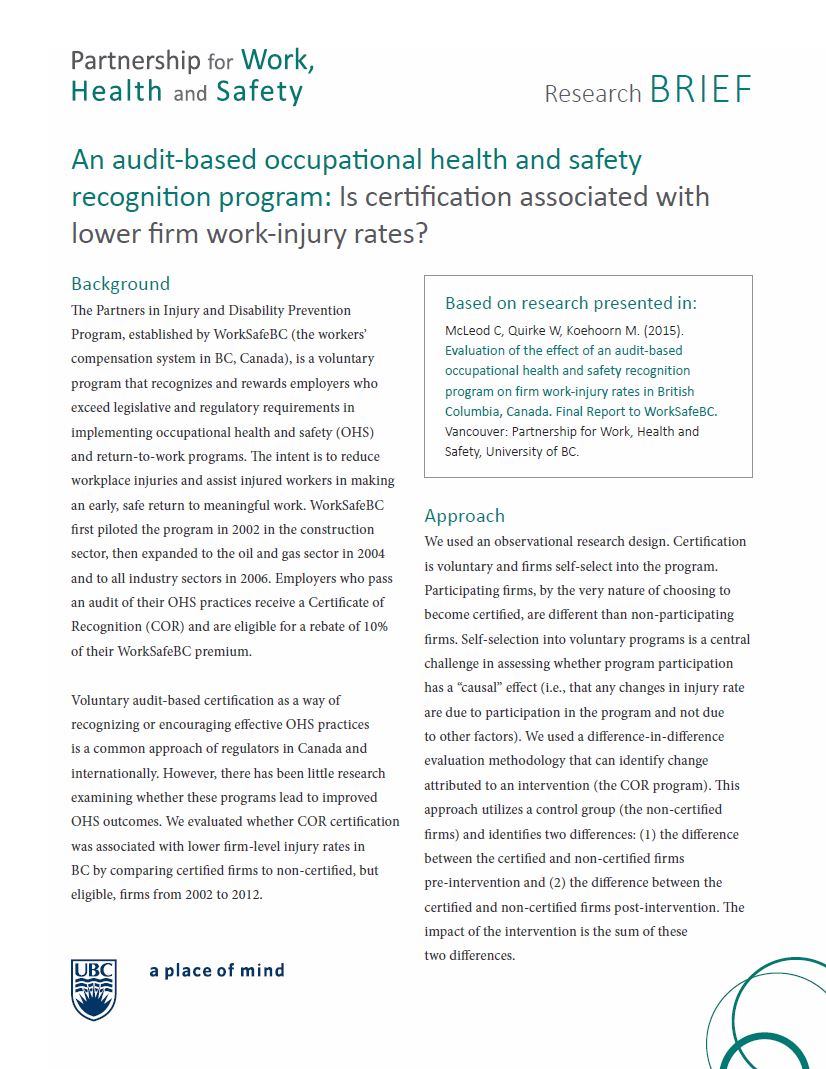In brief
- Immigrant workers, particularly recent immigrants and those who arrived in Canada as refugees, who may have lower English proficiency and a lack of familiarity with Canadian social programs, face particular challenges after a work injury.
- We compared disability durations for work injuries in BC for recent immigrants (less than 10 years in Canada), established immigrants (more than 10 years in Canada), and Canadian-born workers, by linking accepted workers’ compensation claims in BC from 1995-2012 to permanent resident data from Immigration, Refugees and Citizenship Canada.
- In a second analysis, we looked at similar linked data for 2009-2015, for three immigrant classifications: economic, family reunification, and refugee; and for four injury/illness groups: fractures, connective tissue, concussion, and back strain.
- From 1995-2012, both recent and established immigrants had longer work disability durations than Canadian-born workers, and the relationship between immigration status and disability duration was greater for younger immigrant workers than for older immigrant workers and for immigrant men than for immigrant women.
- From 2009-2015, immigrant workers experienced longer work disability durations compared to Canadian-born workers with the same injury. The largest differences were observed for family and refugee/other immigrant classification workers, and, in particular, for women within these classifications.
- Immigrant workers’ longer disability durations may be a result of more severe injuries or challenges navigating the workers’ compensation system with delays in seeking disability benefits and rehabilitation services.
- Differences by immigrant classification speak to vulnerabilities or inequities upon arrival in Canada that persist after entry to the workforce and warrant further investigation for early mitigation strategies.
Next steps
- We are examining the provision of employment-related and rehabilitation services that are meant to provide access to safe work and minimize work disability. By linking immigration data with 1) workers’ compensation and medical services data; and 2) settlement service use for the working population of BC, we will examine the impact of rehabilitation and employment-related services on work and work disability experiences of immigrants compared to Canadian-born workers.
- Evidence of different experiences and of determinants of these differences will provide inputs for discussions and ultimately decisions by policy-makers, employers and regulators/insurers to reduce barriers and health inequities, and improve outcomes for all workers, including immigrants as potentially more vulnerable and precarious workers.
Related publications
“He was Threatened and Told to Cooperate”: Immigrant Worker Experiences with the Workers’ Compensation System in the Canadian Context
Journal article
Senthanar S, Ahmadi B, Creese G, Marino S, McLeod CB, Koehoorn M.
J Occup Rehabil. 2025 Jul 7. doi: 10.1007/s10926-025-10307-1. Online ahead of print.
Provision of employment-related settlement services and relationship with paid employment for immigrants in Canada
Journal article
Senthanar S, Koehoorn M, McLeod CB.
PLoS One. 2025 Apr 29;20(4):e0321927. doi: 10.1371/journal.pone.0321927.
Differences in Modified-Return-to-Work by Immigration Characteristics Among a Cohort of Workers in British Columbia, Canada
Journal article
Senthanar S, Koehoorn M, Tamburic L, Premji S, Bültmann U, McLeod CB.
Journal of Occupational Rehabilitation. 2022 October 29. https://doi.org/10.1007/s10926-022-10077-0.
Immigrant status, gender and work disability duration: findings from a linked, retrospective cohort of workers’ compensation and immigration data from British Columbia, Canada
Journal article
Saffari N, Senthanar S, Koehoorn M, McGrail K, McLeod C.
Occupational and Environmental Medicine. 2021;11(12).
Differences in work disability duration for immigrants and Canadian-born workers in British Columbia, Canada
Journal article
Senthanar S, Koehoorn M, Tamburic L, Premji S, Bültmann U, McLeod CB.
International Journal of Environmental Research and Public Health. 2021;18(22):11794.
Resuming economic activities during COVID-19: A comparison of experiences for immigrant versus Canadian-born workers with a gendered perspective
Research brief based on analysis of the Statistics Canada Canadian Perspectives Survey, Series 3, addressing the impacts of COVID-19. July 2021.
Chen M, Senthanar S, Koehoorn M. Vancouver, BC: Partnership for Work, Health and Safety; July 2021.
Impact of COVID-19 on employment and financial security of immigrant workers compared to Canadian-born workers
Research brief based on analysis of the Statistics Canada Canadian Perspectives Survey, Series 1, addressing the impacts of COVID-19. June 2020.
Immigration Status and Work Disability Duration in British Columbia
Thesis
Saffari N.
Vancouver: The University of British Columbia; 2016.
Download a research brief describing the thesis findings
